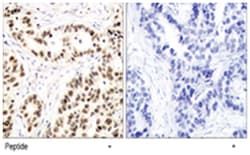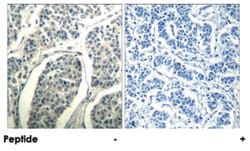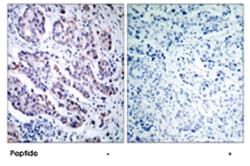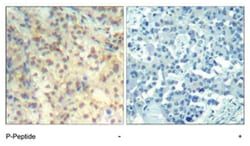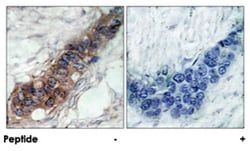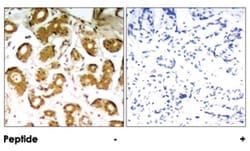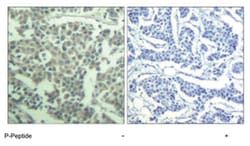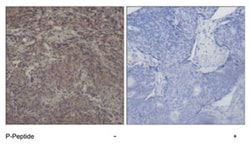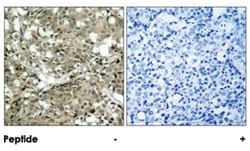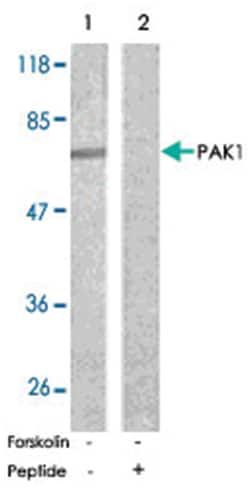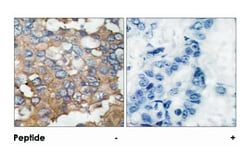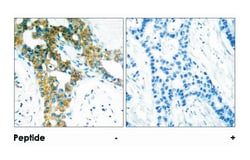89-128-360
ABL1 Rabbit anti-Human, Mouse, Polyclonal Antibody, Abnova™
Manufacturer: Abnova Corporation
Select a Size
| Pack Size | SKU | Availability | Price |
|---|---|---|---|
| Each of 1 | 89-128-360-Each-of-1 | In Stock | ₹ 53,133.00 |
89-128-360 - Each of 1
In Stock
Quantity
1
Base Price: ₹ 53,133.00
GST (18%): ₹ 9,563.94
Total Price: ₹ 62,696.94
Antigen
ABL1
Classification
Polyclonal
Conjugate
Unconjugated
Dilution
Immunohistochemistry (1:50-1:100) The optimal working dilution should be determined by the end user.
Gene
ABL1
Gene Alias
ABL/JTK7/bcr/abl/c-ABL/p150/v-abl
Host Species
Rabbit
Purification Method
Affinity chromatography
Regulatory Status
RUO
Gene ID (Entrez)
25
Content And Storage
Store at -20°C.Aliquot to avoid repeated freezing and thawing.
Applications
Immunohistochemistry (PFA fixed)
Concentration
1 mg/mL
Description
Rabbit polyclonal antibody raised against synthetic peptide of ABL1.
Formulation
In PBS (without mg2+and Ca2+), 150mM NaCl, pH 7.4 (50% glycerol, 0.02% sodium azide)
Gene Accession No.
P00519
Gene Symbols
ABL1
Immunogen
A synthetic peptide corresponding to residues surrounding Y412 of human ABL1.
Quantity
100 μg
Primary or Secondary
Primary
Target Species
Human, Mouse
Form
Liquid
Description
- The ABL1 protooncogene encodes a cytoplasmic and nuclear protein tyrosine kinase that has been implicated in processes of cell differentiation, cell division, cell adhesion, and stress response
- Activity of c-Abl protein is negatively regulated by its SH3 domain, and deletion of the SH3 domain turns ABL1 into an oncogene
- The t(9;22) translocation results in the head-to-tail fusion of the BCR (MIM:151410) and ABL1 genes present in many cases of chronic myelogeneous leukemia
- The DNA-binding activity of the ubiquitously expressed ABL1 tyrosine kinase is regulated by CDC2-mediated phosphorylation, suggesting a cell cycle function for ABL1
- The ABL1 gene is expressed as either a 6- or 7kb mRNA transcript, with alternatively spliced first exons spliced to the common exons 2-11
- [provided by RefSeq Sequence: D-T-Yp-T-A
Compare Similar Items
Show Difference
Antigen: ABL1
Classification: Polyclonal
Conjugate: Unconjugated
Dilution: Immunohistochemistry (1:50-1:100) The optimal working dilution should be determined by the end user.
Gene: ABL1
Gene Alias: ABL/JTK7/bcr/abl/c-ABL/p150/v-abl
Host Species: Rabbit
Purification Method: Affinity chromatography
Regulatory Status: RUO
Gene ID (Entrez): 25
Content And Storage: Store at -20°C.Aliquot to avoid repeated freezing and thawing.
Applications: Immunohistochemistry (PFA fixed)
Concentration: 1 mg/mL
Description: Rabbit polyclonal antibody raised against synthetic peptide of ABL1.
Formulation: In PBS (without mg2+and Ca2+), 150mM NaCl, pH 7.4 (50% glycerol, 0.02% sodium azide)
Gene Accession No.: P00519
Gene Symbols: ABL1
Immunogen: A synthetic peptide corresponding to residues surrounding Y412 of human ABL1.
Quantity: 100 μg
Primary or Secondary: Primary
Target Species: Human, Mouse
Form: Liquid
Antigen:
ABL1
Classification:
Polyclonal
Conjugate:
Unconjugated
Dilution:
Immunohistochemistry (1:50-1:100) The optimal working dilution should be determined by the end user.
Gene:
ABL1
Gene Alias:
ABL/JTK7/bcr/abl/c-ABL/p150/v-abl
Host Species:
Rabbit
Purification Method:
Affinity chromatography
Regulatory Status:
RUO
Gene ID (Entrez):
25
Content And Storage:
Store at -20°C.Aliquot to avoid repeated freezing and thawing.
Applications:
Immunohistochemistry (PFA fixed)
Concentration:
1 mg/mL
Description:
Rabbit polyclonal antibody raised against synthetic peptide of ABL1.
Formulation:
In PBS (without mg2+and Ca2+), 150mM NaCl, pH 7.4 (50% glycerol, 0.02% sodium azide)
Gene Accession No.:
P00519
Gene Symbols:
ABL1
Immunogen:
A synthetic peptide corresponding to residues surrounding Y412 of human ABL1.
Quantity:
100 μg
Primary or Secondary:
Primary
Target Species:
Human, Mouse
Form:
Liquid
Antigen: PAK1
Classification: Polyclonal
Conjugate: Unconjugated
Dilution: Western Blot (1:500-1:1000) Immunohistochemistry (1:50-1:100) The optimal working dilution should be determined by the end user.
Gene: PAK1
Gene Alias: MGC130000/MGC130001/PAKalpha
Host Species: Rabbit
Purification Method: Affinity chromatography
Regulatory Status: RUO
Gene ID (Entrez): 5058
Content And Storage: Store at -20°C.Aliquot to avoid repeated freezing and thawing.
Applications: Immunohistochemistry (PFA fixed), Western Blot
Concentration: 1 mg/mL
Description: Rabbit polyclonal antibody raised against synthetic peptide of PAK1.
Formulation: In PBS (without Mg2+and Ca2+), 150mM NaCl, pH 7.4 (50% glycerol, 0.02% sodium azide)
Gene Accession No.: __
Gene Symbols: PAK1
Immunogen: A synthetic peptide corresponding to residues surrounding T212 of human PAK1.
Quantity: 100 μg
Primary or Secondary: Primary
Target Species: Human, Mouse, Rat
Form: Liquid
Antigen:
PAK1
Classification:
Polyclonal
Conjugate:
Unconjugated
Dilution:
Western Blot (1:500-1:1000) Immunohistochemistry (1:50-1:100) The optimal working dilution should be determined by the end user.
Gene:
PAK1
Gene Alias:
MGC130000/MGC130001/PAKalpha
Host Species:
Rabbit
Purification Method:
Affinity chromatography
Regulatory Status:
RUO
Gene ID (Entrez):
5058
Content And Storage:
Store at -20°C.Aliquot to avoid repeated freezing and thawing.
Applications:
Immunohistochemistry (PFA fixed), Western Blot
Concentration:
1 mg/mL
Description:
Rabbit polyclonal antibody raised against synthetic peptide of PAK1.
Formulation:
In PBS (without Mg2+and Ca2+), 150mM NaCl, pH 7.4 (50% glycerol, 0.02% sodium azide)
Gene Accession No.:
__
Gene Symbols:
PAK1
Immunogen:
A synthetic peptide corresponding to residues surrounding T212 of human PAK1.
Quantity:
100 μg
Primary or Secondary:
Primary
Target Species:
Human, Mouse, Rat
Form:
Liquid
Antigen: SRC
Classification: Polyclonal
Conjugate: Unconjugated
Dilution: Western Blot (1:500-1:1000) Immunohistochemistry (1:50-1:100) The optimal working dilution should be determined by the end user.
Gene: SRC
Gene Alias: ASV/SRC1/c-SRC/p60-Src
Host Species: Rabbit
Purification Method: Affinity chromatography
Regulatory Status: RUO
Gene ID (Entrez): 6714
Content And Storage: Store at -20°C.Aliquot to avoid repeated freezing and thawing.
Applications: Immunohistochemistry (PFA fixed), Western Blot
Concentration: 1 mg/mL
Description: Rabbit polyclonal antibody raised against synthetic peptide of SRC.
Formulation: In PBS (without Mg2+and Ca2+), 150mM NaCl, pH 7.4 (50% glycerol, 0.02% sodium azide)
Gene Accession No.: __
Gene Symbols: SRC
Immunogen: A synthetic peptide corresponding to residues surrounding Y529 of human SRC.
Quantity: 100 μg
Primary or Secondary: Primary
Target Species: Human, Mouse, Rat
Form: Liquid
Antigen:
SRC
Classification:
Polyclonal
Conjugate:
Unconjugated
Dilution:
Western Blot (1:500-1:1000) Immunohistochemistry (1:50-1:100) The optimal working dilution should be determined by the end user.
Gene:
SRC
Gene Alias:
ASV/SRC1/c-SRC/p60-Src
Host Species:
Rabbit
Purification Method:
Affinity chromatography
Regulatory Status:
RUO
Gene ID (Entrez):
6714
Content And Storage:
Store at -20°C.Aliquot to avoid repeated freezing and thawing.
Applications:
Immunohistochemistry (PFA fixed), Western Blot
Concentration:
1 mg/mL
Description:
Rabbit polyclonal antibody raised against synthetic peptide of SRC.
Formulation:
In PBS (without Mg2+and Ca2+), 150mM NaCl, pH 7.4 (50% glycerol, 0.02% sodium azide)
Gene Accession No.:
__
Gene Symbols:
SRC
Immunogen:
A synthetic peptide corresponding to residues surrounding Y529 of human SRC.
Quantity:
100 μg
Primary or Secondary:
Primary
Target Species:
Human, Mouse, Rat
Form:
Liquid
Antigen: PAK1/PAK2/PAK3
Classification: Polyclonal
Conjugate: Unconjugated
Dilution: Immunohistochemistry (1:50-1:100) The optimal working dilution should be determined by the end user.
Gene: __
Gene Alias: MGC130000/MGC130001/PAKalpha
Host Species: Rabbit
Purification Method: Affinity chromatography
Regulatory Status: RUO
Gene ID (Entrez): 5058/5062/5063
Content And Storage: Store at -20°C.Aliquot to avoid repeated freezing and thawing.
Applications: Immunohistochemistry (PFA fixed)
Concentration: 1 mg/mL
Description: Rabbit polyclonal antibody raised against synthetic peptide of PAK1/PAK2/PAK3.
Formulation: In PBS (without Mg2+and Ca2+), 150mM NaCl, pH 7.4 (50% glycerol, 0.02% sodium azide)
Gene Accession No.: __
Gene Symbols: PAK1
Immunogen: A synthetic peptide corresponding to residues surrounding T423 of human PAK1.
Quantity: 100 μg
Primary or Secondary: Primary
Target Species: Human, Mouse, Rat
Form: Liquid
Antigen:
PAK1/PAK2/PAK3
Classification:
Polyclonal
Conjugate:
Unconjugated
Dilution:
Immunohistochemistry (1:50-1:100) The optimal working dilution should be determined by the end user.
Gene:
__
Gene Alias:
MGC130000/MGC130001/PAKalpha
Host Species:
Rabbit
Purification Method:
Affinity chromatography
Regulatory Status:
RUO
Gene ID (Entrez):
5058/5062/5063
Content And Storage:
Store at -20°C.Aliquot to avoid repeated freezing and thawing.
Applications:
Immunohistochemistry (PFA fixed)
Concentration:
1 mg/mL
Description:
Rabbit polyclonal antibody raised against synthetic peptide of PAK1/PAK2/PAK3.
Formulation:
In PBS (without Mg2+and Ca2+), 150mM NaCl, pH 7.4 (50% glycerol, 0.02% sodium azide)
Gene Accession No.:
__
Gene Symbols:
PAK1
Immunogen:
A synthetic peptide corresponding to residues surrounding T423 of human PAK1.
Quantity:
100 μg
Primary or Secondary:
Primary
Target Species:
Human, Mouse, Rat
Form:
Liquid
